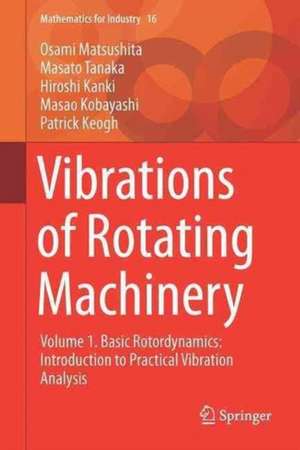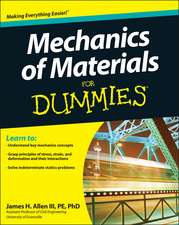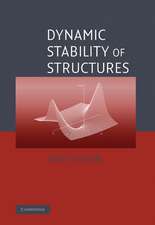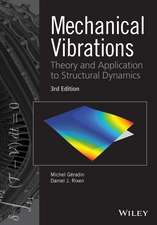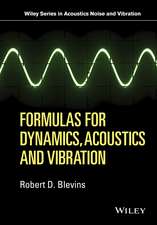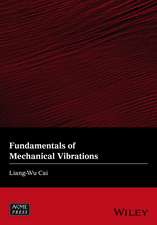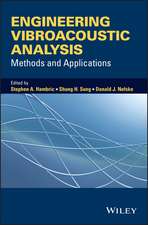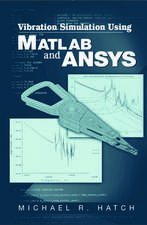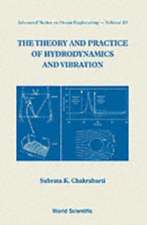Vibrations of Rotating Machinery: Volume 1. Basic Rotordynamics: Introduction to Practical Vibration Analysis: Mathematics for Industry, cartea 16
Autor Osami Matsushita, Masato Tanaka, Hiroshi Kanki, Masao Kobayashi, Patrick Keoghen Limba Engleză Hardback – 30 mai 2017
| Toate formatele și edițiile | Preț | Express |
|---|---|---|
| Paperback (1) | 1220.57 lei 43-57 zile | |
| Springer – 12 aug 2018 | 1220.57 lei 43-57 zile | |
| Hardback (2) | 1226.73 lei 43-57 zile | |
| Springer – 30 mai 2017 | 1226.73 lei 43-57 zile | |
| Springer – 18 mar 2020 | 1400.35 lei 43-57 zile |
Din seria Mathematics for Industry
- 18%
 Preț: 948.79 lei
Preț: 948.79 lei - 20%
 Preț: 644.66 lei
Preț: 644.66 lei -
 Preț: 401.61 lei
Preț: 401.61 lei - 18%
 Preț: 790.14 lei
Preț: 790.14 lei - 24%
 Preț: 773.68 lei
Preț: 773.68 lei - 5%
 Preț: 1416.66 lei
Preț: 1416.66 lei - 15%
 Preț: 651.19 lei
Preț: 651.19 lei - 20%
 Preț: 567.43 lei
Preț: 567.43 lei - 15%
 Preț: 641.71 lei
Preț: 641.71 lei - 18%
 Preț: 944.82 lei
Preț: 944.82 lei - 15%
 Preț: 651.34 lei
Preț: 651.34 lei - 15%
 Preț: 646.62 lei
Preț: 646.62 lei - 15%
 Preț: 645.79 lei
Preț: 645.79 lei - 15%
 Preț: 643.65 lei
Preț: 643.65 lei - 18%
 Preț: 944.36 lei
Preț: 944.36 lei - 15%
 Preț: 641.38 lei
Preț: 641.38 lei - 18%
 Preț: 947.85 lei
Preț: 947.85 lei - 15%
 Preț: 643.48 lei
Preț: 643.48 lei - 18%
 Preț: 945.30 lei
Preț: 945.30 lei - 20%
 Preț: 997.38 lei
Preț: 997.38 lei - 15%
 Preț: 644.30 lei
Preț: 644.30 lei - 18%
 Preț: 946.10 lei
Preț: 946.10 lei - 18%
 Preț: 890.06 lei
Preț: 890.06 lei -
 Preț: 354.54 lei
Preț: 354.54 lei - 18%
 Preț: 1212.84 lei
Preț: 1212.84 lei - 18%
 Preț: 1103.14 lei
Preț: 1103.14 lei - 15%
 Preț: 641.85 lei
Preț: 641.85 lei
Preț: 1226.73 lei
Preț vechi: 1496.01 lei
-18% Nou
Puncte Express: 1840
Preț estimativ în valută:
234.73€ • 245.74$ • 194.23£
234.73€ • 245.74$ • 194.23£
Carte tipărită la comandă
Livrare economică 07-21 aprilie
Preluare comenzi: 021 569.72.76
Specificații
ISBN-13: 9784431554554
ISBN-10: 4431554556
Pagini: 400
Ilustrații: XIII, 360 p. 318 illus., 203 illus. in color.
Dimensiuni: 155 x 235 x 22 mm
Greutate: 0.7 kg
Ediția:1st ed. 2017
Editura: Springer
Colecția Springer
Seria Mathematics for Industry
Locul publicării:Tokyo, Japan
ISBN-10: 4431554556
Pagini: 400
Ilustrații: XIII, 360 p. 318 illus., 203 illus. in color.
Dimensiuni: 155 x 235 x 22 mm
Greutate: 0.7 kg
Ediția:1st ed. 2017
Editura: Springer
Colecția Springer
Seria Mathematics for Industry
Locul publicării:Tokyo, Japan
Public țintă
ResearchCuprins
Introduction.- Single degree-of-freedom rotor.- Modal analysis for multi degree-of-freedom rotor.- Mode synthesis and related modeling.- Unbalance vibration and balancing.- Gyroscopic effects on rotor vibrations.- Approximate eigenvalue evaluation of a rotor-bearing system.- Vibration evaluation using open-loop characteristics.- Transformation from inertial coordinate to rotating coordinate frames of reference.- Vibration of blade and impeller systems.- Basic topics on rotor stability.
Textul de pe ultima copertă
This book opens with an explanation of the vibrations of a single degree-of-freedom (dof) system for all beginners. Subsequently, vibration analysis of multi-dof systems is explained by modal analysis. Mode synthesis modeling is then introduced for system reduction, which aids understanding in a simplified manner of how complicated rotors behave. Rotor balancing techniques are offered for rigid and flexible rotors through several examples. Consideration of gyroscopic influences on the rotordynamics is then provided and vibration evaluation of a rotor-bearing system is emphasized in terms of forward and backward whirl rotor motions through eigenvalue (natural frequency and damping ratio) analysis. In addition to these rotordynamics concerning rotating shaft vibration measured in a stationary reference frame, blade vibrations are analyzed with Coriolis forces expressed in a rotating reference frame. Other phenomena that may be assessed in stationary and rotating reference frames includestability characteristics due to rotor internal damping and instabilities due to asymmetric shaft stiffness and thermal unbalance behavior.
Caracteristici
Focuses on comprehensive evaluation of three key elements of natural frequency; resonance severity; and stability margin, through the use of examples with figures and tables Provides a consistent approach to bridge rotor shaft vibrations featuring gyroscopic effects in an inertial coordinate frame and blade vibrations under Coriolis forces acting in a rotating reference frame Helps to understand applying accurately reduced models to identify the solution of rotor vibration problems Includes supplementary material: sn.pub/extras
